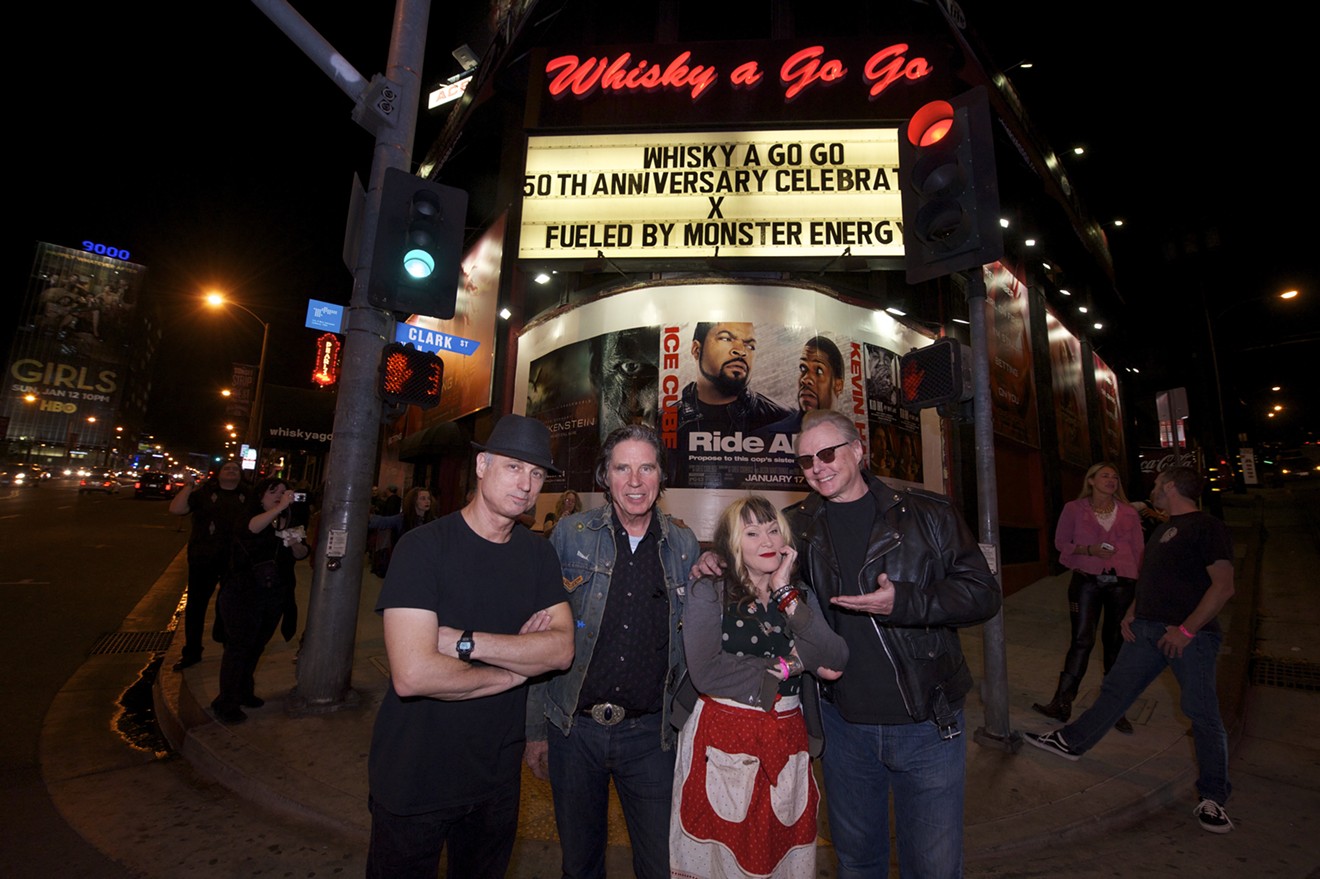Los Angeles answered the call in 1977, and the band leading the way was X.
A trio of accomplished musicians — John Doe, Billy Zoom, DJ Bonebrake, and their feisty poetry muse Exene Cervenka — weaved existential tales and survival of the people who inhabited LA’s back-alleys, makeshift nightclubs, and housing squats. They did it with an unapologetically punk-tinged sound that fused rockabilly, country, and soul.
“I didn’t know if I’d live to see the '80s, especially in the scene we were in,” confesses Bonebrake. “But I will tell before we put out Los Angeles, people started coming to shows, and I think I became less suicidal at that point. I thought, ‘Well, okay. We can do this and I will live, and I have something to fight for.’”
Four decades later, and intact with its original members, X has survived and more, and still has something to fight for: their rightful place among punk’s pantheon. The group's longevity smacks in the face of convention, as X never truly was accepted by the masses, never sold millions of records. Yet the band rode the wave of critical acclaim and built a hard core fan base just big enough and worldwide enough to stay afloat.
“It didn’t matter in that punk scene if you were a guy or a girl,” Cervenka explains.
X broke into the scene on stages both famous and infamous, such as The Masque, which was in the basement of the Pussycat porno shop, The Whiskey a Go Go, Club 88 among others. Their brothers and sisters in arms included the likes of Black Flag, The Blasters, The Flesheaters, Alice, The Germs, The Weirdos, The Zeros, The Alley Cats and Jeffrey Lee Pierce’s Gun Club. All but The Blasters and Go-Gos are still in some ongoing semblance of performing.
“At this
In addition to not being defined by a genre on any of its seven studio albums, X has extended its career by adding acoustic sets to its live performances, not so much as to slow the pace down, but to revisit the live feel for songs.
While songs like signature fast and frenetic songs like “Los Angeles” “We’re Desperate,” “Johnny Hit and Run Paulene,” and later “Hungry Wolf” have always been show staples, songs such as “Come Back to Me” in which Zoom plays sax are now being added in, with new band fifth member Craig Peckham can step in on guitar. Peckham also fills in on drums so the multi-talented Bonebrake can break out the vibraphone as on the crescendoing “I Must Not Think Bad Thoughts.”
“There’s more musicality and there’s more improvisation, and I think we are better musicians now then we were,” adds Doe. “Another unspoken thing, or actually one thing we are saying to each other, is ‘You know this is really fun; this is really cool.’ I’m learning new ways of playing stuff.”
X has survived more than the passing of music trends, it has persevered through band break-ups, the divorce of Doe and Cervenka in the mid-'80s, low album sales on three of its last seven studio releases. It has persevered with determination and band member reunions and most recently in helping guitarist Zoom survive through his battle with bladder cancer in 2015.
For Zoom, known for his trademark buzzsaw rockabilly-laden muscle and finesse, the ability to play is simple. “Being able to work and make a living is always a good thing,” adding, “We’re just not ready to retire yet. I plan on retiring around 2028 after my kids finish college.”
Its first two albums, 1980’s Los Angeles and 1981’s Wild Gift replete with classic punk confessionals and Ginsburg-ish lyrics, were produced by The Doors’ Ray Manzarek. The two albums would make several publications’ Best of Year lists, both recorded on the pioneering punk magazine label, Slash.
Never having “made it big” has been a blessing in disguise and has made the X quartet dedicated to the punk form it began back in 1977.
“It extends your longevity (not making it as a super band) because if you’re a one-hit wonder, people are excited for two months, and then they forget about you,” explains Bonebrake. “What we’ve done, since we had to keep playing, we meet people all the time; we’re really down on the ground. It really extended it over 40 years. The fact that we didn’t have a hit really extended the life of the band.”
As the world moved away from punk and into post-punk factions by the mid-'80s, X would lean toward a more contemporary hard rock sound on Ain’t Love Grand in 1985. The departure of Zoom after this album, opened the door for re-exploration of its more roots, country and folk leanings as was evident on See How We Are in 1987 with the shuffling in and out of The Blaster Dave Alvin and Lone Justice’s Tony Gilkyson.
While its five albums from 1981 to 1987 all made the Billboard Top 200 album chart, the band was never about being filthy rich, just comfortable. However, that is not to say their original music shouldn’t have bigger sellers. They all would have been happy with having sold more records.
“I won’t lie, if we got paid nothing and there were 15 people from the old days that came out to see us, we wouldn’t do it,” Doe says without hesitation. “The fact is we can draw 500-plus people pretty much anywhere we go, and there’s people in their 20s or even younger, and people that are our age, you know, like 50s and 60s that are enjoying it.”
Over the past two decades, members of X have interspersed reunion jaunts as it has worked on solo projects to help bring home paychecks.
Doe, who has a dozen solo albums, out and penned a history of the LA scene along with former Elektra Records A&R man Tom DeSavia and a host of other LA punk
For Cervenka, the sexualized role of women in music has now succumbed to a more in-your-face attitude, putting the appearance before substance even more.
“I know feminism is supposed to be a really great thing, and it is in many ways, but it has unleashed post-Madonna,” explains Cervenka. “This whole slutty, sexy thing. It’s great for women to be sexual, and if you want to go naked on stage, good for you, but I think what it also did was minimize the seriousness of just being a person.”
“Look at Jefferson Airplane and Janis Joplin and Pat Benatar and the Motels [Martha Davis]. If people found them attractive and alluring, it was because they were. It wasn’t because they were working really hard to have their underwear on the outside.”
Doe seconds the sentiment on Cervenka’s impact on young girls and their image.
“Seeing an 18-year-old girl looking up at Exene saying, ‘Wow, she’s cool. She’s my role-model, that’s one of the things that punk rock did. Everybody, women and men, we took pride in being equals. It extended into the Indie Rock world, it extended into the Riot Girl era.”
As for the future of the band beyond touring, the members are split about putting new material out.
“I would certainly like that (recording new material). I don’t know why it’s so hard to accept. Billy’s health has been off and on. It could be done, but it’s different now, though.”
If you go to all the trouble to work and have inspiration at the beginning of writing a song and recording it, and figuring out the arrangement and getting it out and then trying to get it out to the public, the second you give it to someone, it’s on the internet and its free to every single person that wants to hear it. That’s nice for our fans, but we gotta pay for it, and then we are just giving it away.”
Zoom is definitive, “That was then, this is now. Why spoil a good thing?”
“We are in this weird in-between land between bands that have had hits and made a lot of money and bands that have done nothing,” Bonebrake chimes in. “We have been this band that is right in-between. We had critical acclaim; we have very loyal fans, we go out on the road a lot, and we make a living. If we don’t go out on the road, we don’t make a living.”
X’s appearance in the Viva Phoenix festival this Saturday at the Masonic Temple will see it share the stage with Reverend Horton Heat and former Replacements guitarist Tommy Stinson’s Bash and Pop, to name a few.
It will be X’s first show in The Valley since 2014.
“We’re more intimate with these people that come to see us now because
Last October X was invited to play at the Rock and Roll Hall of Fame's American Music Masters series, that time, honoring Johnny Cash the Carter Family. The band did an inspiring version of “If I Were a Carpenter.”
It was the second time the Rock HOF came calling for X, and hopefully, with 40 years under its belt as a relevant band, not the last.










